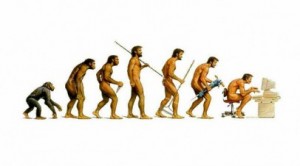We stand on the edge of uncertainty. Publishing is changing, and for writers, that might as well be the apocalypse. The publishing industry as we know it is dissolving. The big publishers are merging, self-publishing and independent publishing have never had easier means of distribution. The writing world has changed.
We should have known. It was only a matter of time. Publishing hadn’t changed much since the printing press was invented. Editors held the keys to the readers. If they didn’t want you to be read, you weren’t. Kate Chopin wrote the now-canonical novella The Awakening which stirred up such a controversy that she never had anything major published after and died a few years later. James Joyce had to rescue Dubliners from a fire after what seemed like the last interested publisher in Ireland decided to burn it rather than return the manuscript. Of course, both of those books found publishers willing to back them and became incredibly influential.
Perhaps Chopin and Joyce would have turned to self-publishing if they lived in our era. Perhaps not. The path to publishing still isn’t easy, and while self-publishing gets you out there, really only gets you as far as the door, with no guarantee of readership.
Still, it is exciting in many ways. For once, the readers, not the publishers, are the gatekeepers to a writer’s success, and that is an exciting thing for some people. Marxist literary theory believes that literature is a tool of bourgeois hegemonic control, because the bourgeois control the means of literary production, deciding what is read. One of the sparks for revolution, then, is the development of an alternative proletariat-based hegemony. Besides attempting to utilize terminology from my current class, I think it is interesting how the changes in publishing are going to affect everything from reading to writing to the very theories about the relationship between literature and society. Access to literature is no longer controlled solely by management in New York.
The scary part is not knowing where I am going to land in this whole thing. I’ve had friends who self-published and had good experiences, better than some experiences of people who have had actual publishers. Then, there have been other friends who have basically gotten nowhere with it. Obviously, there have been stories of great self-publishing successes.
My plan is to try traditional publishing, but I will probably be writing for the next sixty years or so. The very term “publishing” could mean anything by then. Still, the unknown can be exciting, and for those of us trying to make it as writers, the future of publishing is very unknown.


